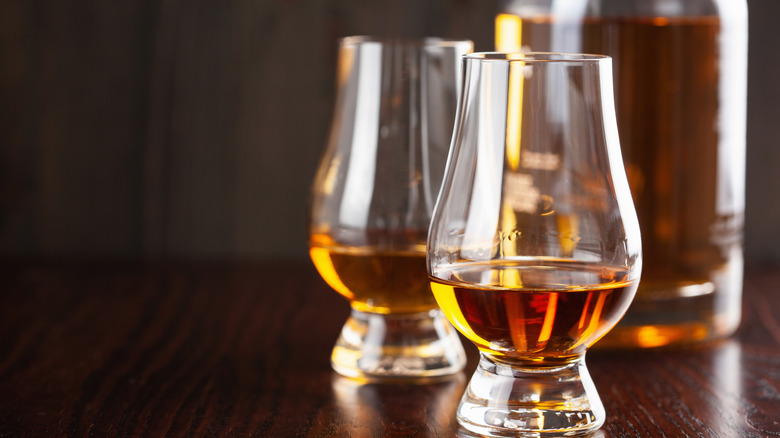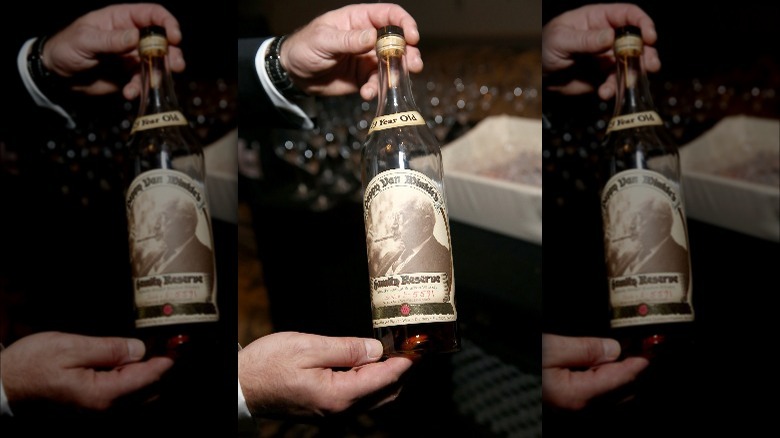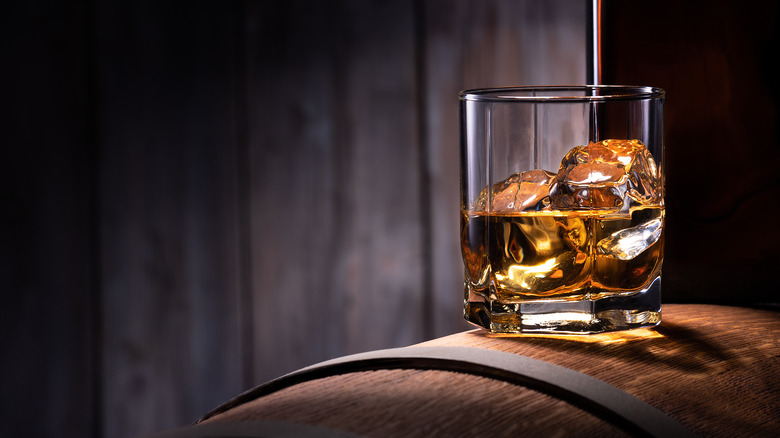Why Is Unicorn Whiskey So Expensive?
Unicorn whiskies are rare bottles of hard-to-find bourbons — like Old Forester's Birthday Bourbon, Four Roses Limited Editions, Buffalo Trace's Antique Collection, or anything produced by Kentucky mainstay Pappy Van Winkle, according to Gear Patrol. And dark spirits aficionados will have to hunt high and low for the good stuff, because it's not available in just any bar, restaurant, or liquor store. There are a few different kinds of unicorn whiskies, with most falling under the umbrella of American whiskies such as Kentucky bourbon and rye. Japanese whisky from distilleries like Suntory are also considered "unicorn status" in the U.S., says Punch, explaining that some Scotches also warrant the unicorn label.
Expensive American bourbon labels like Pappy Van Winkle, Buffalo Trace Distillery's W. L. Weller, and Henry McKenna are among some of the most sought-after because they're made in small batches, sparking hype and causing prices to skyrocket, explains Uproxx. Perhaps leading the charge in most expensive unicorn whiskies is Michter's 25-year-old Straight Rye, which was auctioned off for a whopping $21,000 December 2021, according to Whisky Advocate. (Even your standard bottle of the aged whiskey can sell for well above $8,000 on average, according to Uproxx.)
Special releases and anniversary bottles also lead to hiked-up price tags. Old Forester's Birthday Bourbon — devoted to celebrating the distillery founder George Garvin Brown's birthday — is made in limited editions each year so prices for annual blends found on the secondary market can cost more than $1,000 online, reports Vinepair.
Scarcity and prestige raise the price
Unless they're willing to pay over market price, amassing premium bottles of unicorn whiskies typically requires collectors to enter auctions and lotteries, wait for release dates and move fast, or buddy up with a well-sourced liquor store owner (via Uproxx). Prices run high, as many of these whiskies are released in small batches or are incredibly old bottles — ones novice collectors probably emptied long ago. Think of these bottles as the Birkin bag of whiskies — a luxury, investment piece that only increases in value (meaning you'll want to keep it on a top shelf and indulge on special occasions, or resell it in years to come for a return on your well-earned investment).
Some unicorn whiskies, like those from Pappy Van Winkle, tend to be scarcely available to begin with, since they have won many competitions and have been widely praised as a collector's item. (Anthony Bourdain also added to the prestige of this particular brand, catapulting Pappy further into the luxury spirits space when he drank it on his show "The Layover" in 2012 boldly declaring: "If God made Bourbon, this is what he'd make.") The manufacturer only releases 84,000 bottles annually, according to Mixer Direct, and because getting a bottle is so rare and the brand so prestigious, those lucky enough to get their hands on one can sell it on the second-hand market for three times the price or more. A 23-year-old bottle of Pappy Van winkle, for example, that retailed for $270 could be resold for thousands, the Wall Street Journal reported.
How to score a unicorn whiskey
While supply and demand is what's driving the scarcity of unicorn whiskies, there are still ways for novice collectors to get in the game. The platform Unicorn Auctions lets imbibers register to bid online on some of the most bespoke bottles, though it charges a 15% premium added to the hammer price if you win the bid. Other ways to shop include the Bourbon Concierge, a family-owned business that can help collectors find the bottle they're looking for. Lotteries and buy-in raffles are another popular way collectors get access to high-end bottles (via Uproxx).
You also don't necessarily have to break the bank to get your hands on a coveted bottle. Labels like Maker's Mark, Buffalo Trace, and Wild Turkey boast less expensive options ranging between $40 and $175, according to Vinepair, which the drinks and sprits outlet is predicting will be the unicorn whiskies of tomorrow.


